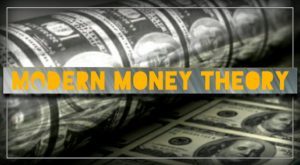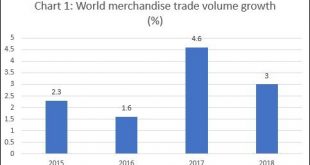Read More »
Adani again
In pointing out that Adani’s Carmichael mine wasn’t viable without government help, I focused on the possibility of a concessional loan from Australia’s Export Finance Insurance Corporation. As commenters have pointed out, Adani (a prominent crony of Indian PM Modi) looks like being able to charge above-market prices for electricity in India. I’m not clear whether this helps much to make the Carmichael project viable. Over the fold, an exchange I had with Charles Worringham. In...
Read More »Martin Wolf says MMT is right, but …
from Lars Syll Now we come to the core of Wolf’s objection. It is, as he admits, political. And it is that politicians might use their judgements. Heaven forbid! Wolf is very clearly of the school that created economics to impose constraint on that judgement so that full employment, rising real wages and a redistribution from capital to labour may not happen. And now he is petrified that the so-called economics that underpinned that heinous political system is shown to be wrong the...
Read More »Disruption in the world of trade
from C. P. Chandrasekhar and Jayati Ghosh World trade is in deceleration mode. After having recovered smartly from 2.3 and 1.6 per cent in 2015 and 2016 to 4.6 per cent in 2017, the growth in the volume of world merchandise trade slowed to 3.0 per cent in 2018, WTO estimates show (Chart 1). The deceleration has been greater in recent quarters. Quarter-on-quarter growth rates, as estimated by the Netherlands Centraal Planbureau (CPB) indicate that trade growth fell from 1.1 per cent in...
Read More »Tariffs are a bad response to an imaginary border crisis
from Mark Weisbrot Donald Trump won the presidency–despite losing the popular vote by 2.8 million—with a campaign that careened wildly from one distraction to another. He has clung to this as a Twitter and governing strategy ever since. As there are 190 countries in the world, and the United States trades with most of them, trade wars so far have provided a shovel-ready supply of such diversions. So, here we are: Last Thursday, just in time to distract from the more potentially violent...
Read More »Krugman vs Krugman
from Lars Syll Paul Krugman wonders why no one listens to academic economists … One answer is that economists don’t listen to themselves. More precisely, liberal economists like Krugman who want the state to take a more active role in managing the economy, continue to teach an economic theory that has no place for activist policy. Let me give a concrete example. One of Krugman’s bugaboos is the persistence of claims that expansionary monetary policy must lead to higher inflation … But...
Read More »New York City moves forward with paid vacation measure
from Dean Baker Workers in the United States now put in more time than workers in any other wealthy country, including Japan. This week New York’s city council will begin to consider a measure put forward by Mayor Bill de Blasio that would guarantee workers in the city at least 10 days of paid time off per year. This proposal is an important step toward bringing the United States inline with the other rich countries in guaranteeing its workers some amount of paid vacation. As a new report...
Read More »Plausible Socialism
After the fall of the Berlin Wall, there was a widespread sense that liberal capitalism had triumphed in the battle of ideas, and that socialism as a plausible alternative was pretty much dead. But the many crises of contemporary capitalism – obscene levels of economic inequality, looming ecological disaster, the rise of the racist and anti democratic populist right, the new threats of surveillance capitalism and the surveillance state – threaten dystopia, an unbearable future. In...
Read More »Plausible Socialism
After the fall of the Berlin Wall, there was a widespread sense that liberal capitalism had triumphed in the battle of ideas, and that socialism as a plausible alternative was pretty much dead. But the many crises of contemporary capitalism – obscene levels of economic inequality, looming ecological disaster, the rise of the racist and anti democratic populist right, the new threats of surveillance capitalism and the surveillance state – threaten dystopia, an unbearable...
Read More »How to think about statistics
from Lars Syll [embedded content] If anything, Gelman’s talk underlines how important it is not to equate science with statistical calculation. All science entail human judgement, and using statistical models doesn’t relieve us of that necessity. Working with misspecified models, the scientific value of statistics is actually zero — even though you’re making valid statistical inferences! Statistical models are no substitutes for doing real science. Or as a famous German philosopher...
Read More » Heterodox
Heterodox




